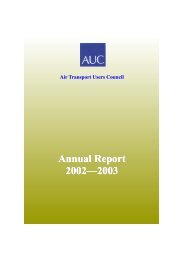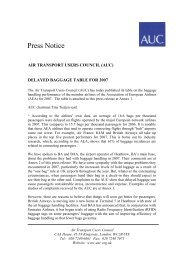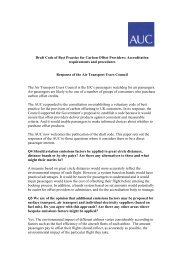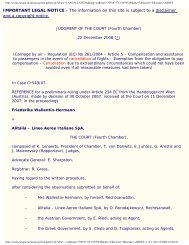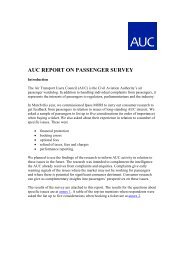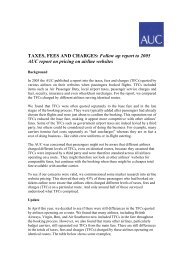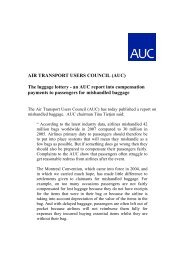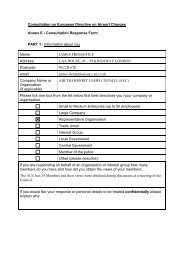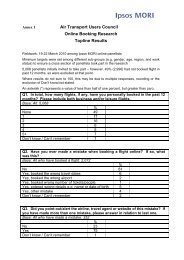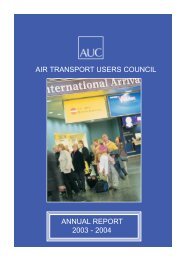Complaints and enquiries - Air Transport Users Council
Complaints and enquiries - Air Transport Users Council
Complaints and enquiries - Air Transport Users Council
Create successful ePaper yourself
Turn your PDF publications into a flip-book with our unique Google optimized e-Paper software.
8<br />
compensate a number of passengers for cancellations caused by “crew<br />
shortages” – we argued that this was foreseeable (<strong>and</strong> therefore not an<br />
“extraordinary” circumstance) <strong>and</strong> could be prevented by rostering extra<br />
backup staff to cover for any shortages.<br />
Our success with these types of complaints <strong>and</strong> the recent European Court of<br />
Justice ruling on the “Wallentin” case (see box below) gives us renewed<br />
optimism that passengers will be in a better position in the future to pursue<br />
their right to compensation when their flight is cancelled.<br />
Summary of European Court of Justice Judgement C-549/07- Wallentin – Hermann<br />
22 December 2008<br />
Background<br />
Mrs Wallentin-Hermann’s flight from Vienna to Brindlisi on Alitalia was cancelled as a<br />
result of an engine defect which had been discovered the day before during a check.<br />
Following the airline’s refusal to pay her compensation, Mrs Wallentin-Hermann went to<br />
court in Austria. The Commercial Court, Vienna, made a reference to the Court of Justice<br />
of the European Communities about whether the technical problems which led to the<br />
cancellation of the flight were covered by ‘extraordinary circumstances’ under Regulation<br />
(EC) No 261/2004 <strong>and</strong> therefore would exempt Alitalia from the obligation to pay<br />
compensation.<br />
Judgement<br />
The Court of Justice found that “in the light of the specific conditions in which air travel<br />
takes place <strong>and</strong> the degree of technological sophistication of aircraft, airlines are<br />
confronted as a matter of course in the exercise of their activity with various technical<br />
problems to which the operation of those aircraft inevitably gives rise. The resolution of a<br />
technical problem caused by failure to maintain an aircraft must therefore be regarded as<br />
inherent in the normal exercise of an air carrier’s activity. Consequently, technical<br />
problems which come to light during maintenance of aircraft or on account of failure to<br />
carry out such maintenance do not constitute, in themselves, ‘extraordinary<br />
circumstances’.”<br />
However, it did not rule out altogether that technical problems could be considered<br />
“extraordinary circumstances”. It suggested that problems that stemmed from events<br />
“which are not inherent in the normal exercise of the activity of the air carrier concerned<br />
<strong>and</strong> are beyond its actual control” might be considered “exceptional circumstances”. For<br />
example, if a fleet of the aircraft were affected by a hidden manufacturing defect which<br />
impinged on flight safety.<br />
A passenger had a reservation for a flight from the Isle of Man to Birmingham.<br />
Unfortunately her flight was cancelled due to technical difficulties. The airline<br />
subsequently refused her claim for compensation. We took up her case with the<br />
airline <strong>and</strong> argued that, in light of the Wallentin ruling, the passenger was due<br />
£250 in compensation under Regulation EC261/2004. The airline subsequently<br />
paid up.



